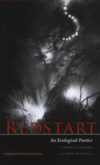Redstart
This is both an interesting and useful book, particularly as a text of poetic collaboration that is at once an investigation and interrogation of, as well as elaboration on, ecological poetics. Forrest Gander and John Kinsella have gathered together poems along with various bits of investigative prose which they’ve been trading back and forth in personal correspondence to produce a hybrid text with simple intentions addressing a global issue of escalating crisis.
This is both an interesting and useful book, particularly as a text of poetic collaboration that is at once an investigation and interrogation of, as well as elaboration on, ecological poetics. Forrest Gander and John Kinsella have gathered together poems along with various bits of investigative prose which they’ve been trading back and forth in personal correspondence to produce a hybrid text with simple intentions addressing a global issue of escalating crisis.
In Kinsella’s own words:
This writing is a map of my conditions out of which arose a series of poems exchanged with a fellow poet. A fellow poet who is concerned about damage done to ecologies and interested in the “nature” of exchanges about landscape and place, like myself. Maybe we feel a kinship and a compulsion to exchange texts. To connect and diverge.
The environment of any poem is composed from what the poet’s eye witnesses and the imagination alights upon. As a result any situation which impacts things in the world surrounding the poet may enter into the poem. For Kinsella, this takes form in his observation of movements made by local yellow-rumped thornbills in flight together from tree to tree round the landscape where he lives. Kinsella legally owns the land yet refuses accept the understanding common to societal contracts concerning property:
I reject “property” in all its forms. I only ever refer to this place as a “property” with scare quotes and irony in mind. It is land stolen from the Ballardong Nyungar people, whose relationship with land was and is custodial as well as spiritual, religious, communal, totemic, and interactive. It is also, to my mind, land to be shared: between not only people, but plants and animals and people. We see ourselves as custodians under a corrupt system that would damage it more than we do and would offer fewer rights to animals and plants than we do. It’s a relationship of necessity, not of choice.
While Kinsella’s pieces of writing throughout the book generally hold to a more personal and local perspective, Gander’s contributions tend to adopt a broader view and introduce specific, inescapable facts:
By the end of the twenty-first century, a mere three hundred years after coal was first intensively mined, a vast amount of the carbon that accumulated underground for over three hundred million years will have been released into the atmosphere. The relation between those two sets of numbers, three hundred and three hundred million, represents six orders of magnitude.
The full ramifications this colossal realignment of the planet’s resources will have remain unknowable for now. However, the general consensus that policies and behaviors need to change is only growing. Merely increasing awareness of the issue has occasioned a broad international response of concern from the world community, in which the continual development of an “ecological poetics” plays its part. Gander’s claims for this field of inquiry may appear rather cute and somewhat dubious at times. For instance, “A poem, even exchanged from its context and the time of its writing, is a curiously renewable form of energy,” yet there’s no doubt as to his sincerity: “If language does affect the way we think about being in the world, poetry can make something happen. I would suggest that it does.” Ultimately, this creative work joins with accompanying political work in the struggle within the international community to alter our dependence upon the earth’s undeniably limited natural resources. The hope remains, as Gander puts it, that “poems might be seen to take responsibility for certain ways of thinking and writing.”





